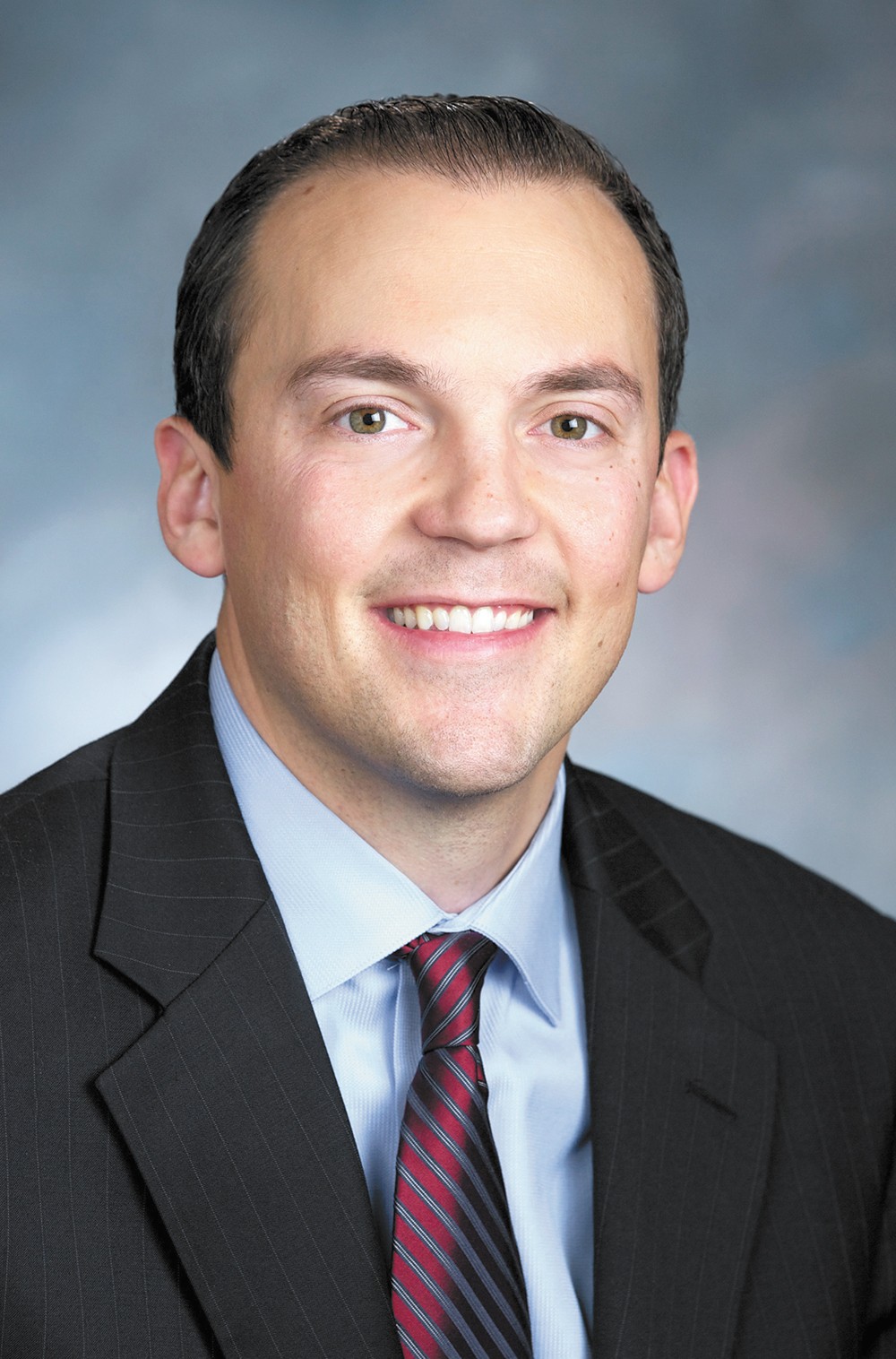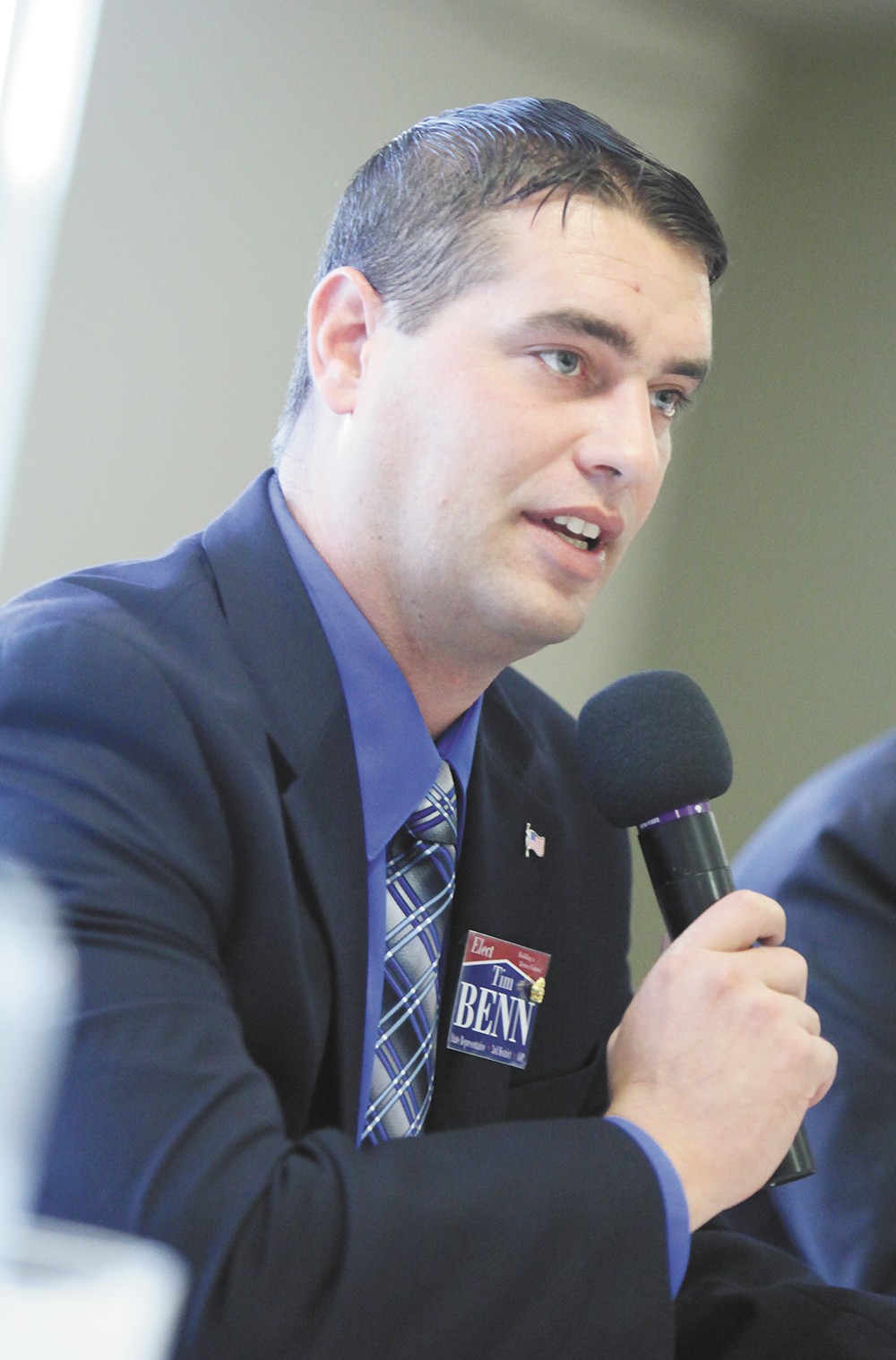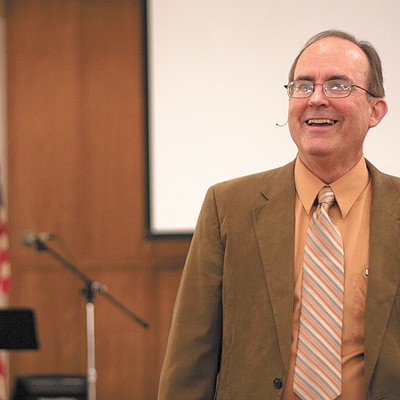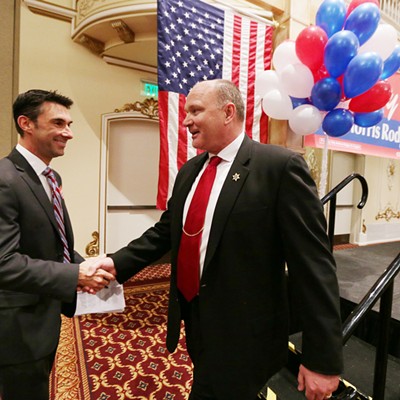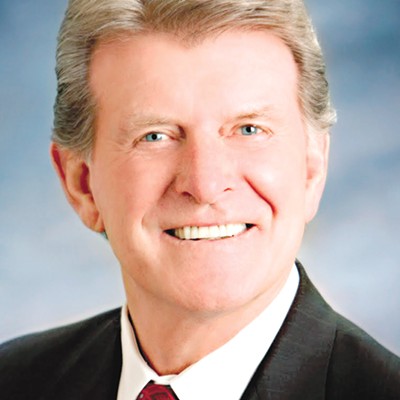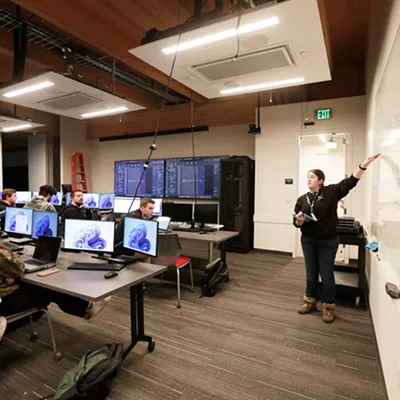If this matchup seems familiar, it should. Tim Benn (running this year as an "Independent R") challenged incumbent Marcus Riccelli, a Democrat who represents the 3rd District, last time around, too. Covering Spokane's core, the 3rd is a reliably left-leaning stronghold and it shows in this race: Benn has raised just $8,100 to Riccelli's $110,600.
Benn, who owns a daycare and has lobbied Olympia to ease regulations on home child-care providers, says his status as a political outsider means he'll bring fresh ideas to Olympia, with a focus on finding efficiencies in programs that already exist. Riccelli has focused on health care and education, and includes in his accomplishments securing funding for the Northwest Museum of Arts and Culture and social services like SNAP and Crosswalk Youth Shelter.
Both acknowledge the challenge facing the legislature in light of the state Supreme Court's McCleary decision — calling for more education funding — but Benn believes the state can address that by better spending the dollars already going to schools. Riccelli has said the state should close tax loopholes to find new funding.
Candidate Q&A
If elected, what will you work to accomplish in the Legislature next session?
Marcus Riccelli (Democrat): My broad goals are to make sure we're investing in our neighborhood schools, creating jobs and protecting our most vulnerable. Specific goals include delivering the funding and policy changes needed to start a medical school in Spokane and supporting a package that would complete the North Spokane corridor, or at least to I-90, and then making sure we're doing right by our children and meeting our constitutional obligation, which means enhancing education to produce better results for students, and for me, that means looking at education from early learning all the way through making college affordable.
Tim Benn (Republican): My top priority is to represent and advocate for the rights of the citizens of the 3rd District regardless of party positions. I am concerned with maintaining small businesses for a vibrant economy. I am running for office because I believe I can bring fresh ideas that represent the average citizen to Olympia. As a husband, a father and small business owner, I am concerned about families, education and our local small businesses. My goal is to make Washington state family- and business-friendly.
The Legislature is obligated under the state Supreme Court to fully fund K-12 education by 2018. How can the Legislature keep good on this promise while facing a projected budget shortfall? Would you support any plans for increasing the state’s revenue?
Riccelli (D): As the husband of a school counselor and parent of two young children, I know we have a responsibility to fully fund K-12 education. To enhance education and produce better results for students, we must invest more. We have to find new and innovative ways to find the dollars to meet our constitutional obligation. Aggressively pursuing the closure of some of our more egregious tax loopholes is one way.
Benn (R): Only half of the money spent on education makes it to the students’ classrooms. One way of making better use of the already large budget is to look for additional efficiencies.
Without additional sources of revenue, state agencies will be forced to cut funding to balance the 2015-17 budget. In your opinion, which programs and services can afford these budget reductions? On the other hand, which programs and services would you strive to protect from these cuts?
Riccelli (D): I believe no one should ever go hungry, and everyone deserves a roof overhead and a safe place to call home. Kids cannot succeed in school when they are doing their homework under the dome light of their car. Parents cannot secure a bright future for their children when they can’t put food on the table, and people who are trying to get back on their feet need something to hold onto. Our community is stronger when all of us have the economic security and stability needed to thrive. I will continue to be a strong voice for our most vulnerable children, seniors and veterans so that we can all move forward together, and that includes the services that help lift them up.
Benn (R): The state needs to protect the vulnerable and the programs that are effective and efficient. The Washington State Legislature should restructure inefficient agencies and programs to better serve the public.
Would you support Gov. Inslee’s proposed carbon emissions tax and/or cap-and-trade system? If not, what, if anything, should Washington do to cut greenhouse gas emissions in order meet the carbon-emissions reduction targets set by the Legislature in 2008?
Riccelli (D): Climate change is our top environmental challenge. It must be addressed in a myriad of ways. One small example is, as we are funding new capital state facilities or retrofitting and upgrading existing ones, we should look at the long-term savings vs. costs of making them energy efficient. We might invest additional money up front, but there will be long-term fiscal and environmental payoff in the long run. I also believe one of the most important things we can be doing right now is looking at how we better conserve the energy we are already using. Ignoring climate change simply does not make sense, or dollars and cents.
Benn (R): Washington state is one of the cleanest states in the country. The law of 2008 can be changed to be more in line with research and data. I do not support the governor’s proposal which will ultimately cap business growth and needed jobs.
As Washington faces a looming doctor shortage, Washington State University is asking the Legislature for $2.5 million to establish its own medical school. Would you support this request from WSU? If not, what’s your plan for filling this growing need in our health care industry?
Riccelli (D): I have been a continuous supporter for WSU establishing their own medical school. This will be my top budget priority for this region. I will work tirelessly as Vice Chair of the Health Care Committee for this funding, and in a bipartisan fashion. My experience has allowed me to be uniquely positioned to deliver on the medical school. Spokane's future is linked to growing the health-care sector, and this would help address the doctor shortage and create economic development through biomedical research. I will work hard to deliver this and believe I am in a strong position to make it happen.
Benn (R): I withhold my opinion at this time. A feasibility study for the long-term sustainability is necessary before making a statement of support or opposition. According to the article in the Inlander, the school would need an additional $50 million operating budget. A pilot program for 20 students was established with only nine enrolled. Students were surveyed and most preferred [University of Washington] for this degree.
As the recreational marijuana industry continues to grow, what reforms would you support to the medical and/or recreational markets?
Riccelli (D): As Vice Chair of the House Health Care Committee and an advisory board member for Daybreak Youth Services, which helps teens fighting addiction, I am deeply concerned about underage substance abuse. Washington voted to legalize marijuana to dissolve the unregulated market and replace it with a safe and transparent marketplace that can restrict underage sales. The revenue generated will be used for regulation, enforcement, and substance abuse education — especially for youth. “Business as usual” wasn’t keeping our kids safe. As legalization continues to unfold, I will work hard to ensure the health and safety of our community come first.
Benn (R): This is a new area of bureaucracy that is continuously changing and the Legislature will have to revisit this issue regularly. The Legislature should protect those stuck in the gray areas of this new industry. Public safety is the most important issue to address.
After accepting $8.7 billion in tax breaks, Boeing recently announced it will move 2,000 jobs to Oklahoma City and St. Louis. What incentives should Washington offer to big businesses to keep them from moving jobs out of state?
Riccelli (D): First there should be clawbacks associated with tax breaks, so if a company does send jobs out of the region they shouldn’t continue to benefit from them. I believe that exemptions should be scrutinized to ensure they are meeting the outcomes set forth by the Legislature. Those that are not benefiting the economy or creating jobs should expire. I do believe there are exemptions that are meeting the criteria and play a role in helping the economy. When exemptions sunset, they should be put through a rigorous and transparent process to ensure the Legislature and the public have full information to make an informed decision. Only after exemptions have been held up to a thorough review and heavily scrutinized should the state invest or reinvest in a particular exemption/tax break.
Benn (R): Government should not be in the business of picking winners and losers; when it is, the taxpayers are always the losers. There should be a lesson learned with giving breaks to certain corporations that will always navigate the system to their own best interests. This should bring caution for further such legislation.
Here at the Inlander, we’ve written extensively about the cracks in our mental health system. Our stories have touched on the burden of mental illness on the criminal justice system, punitive conditions at Eastern State Hospital, psychiatric boarding, and the difficulty of getting care in rural areas. What specific steps would you support to improve mental health care in Washington?
Riccelli (D): I think think we should have a community health social worker who is connecting people with mental health issues, substance abuse issue and housing issues. … We know a lot of those things are co-occurring, and if they don't have housing they're not going to be successful. We need to look at restorative justice practices as opposed to locking people up if we don’t have to. Addressing the root cause that leads to criminal behavior can prevent crime from happening in the first place.
Benn (R): There are a plethora of small yet efficient solutions if the legislature would listen to the individuals within the system. This is not a time for corporate lobbying, but a time to hear the pain and common-sense solutions of ordinary people. So far, the proposed solutions have focused too much on the profiteering of big conglomerates within the industry.

